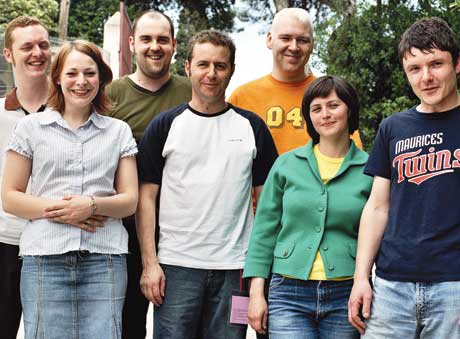Girls who came of age in the UK during the late 70s, might be familiar with Puffin Books: paperback treasures sold alongside sweets and "girls' comics," with a suggested readership of "girls aged 8 to 14, and sensitive boys." This very precise demographic, now grown, takes centre stage in the songs of Camera Obscura, conjurers of airy 60s pop and tales of adolescence-tinged adulthood. The Glaswegian band's first North American release, Underacheivers Please Try Harder, is rife with impending heartbreak: disastrously-timed passes and bungled affairs, catty gossip and boys who "read books written for girls." Bandleader Tracyanne Campbell writes with painful self-absorption, her lyrics so drenched in ineptitude it would be too much to endure without her wicked sense of humour. Some respite is provided by John Henderson and his modish Cohen-isms, offering a slightly more chipper take on the clumsy romance chronicles of Underachiever. The arrangements evoke sunny days of Hatch & Trent and pastel handbags, suggestive of an era gone by without merely mimicking it. That said, the album could use a few more unabashed finger-snapping Supremes-loving ditties like "Let Me Go Home," which along with the dreamy "Teenager," truly is sublime.
Your songs not only evoke this classic sound, they nail the sensibility. Tracyanne Campbell: I don't know if I'd necessarily agree that we've nailed that it's always a compliment to me when people say they can hear the 60s in our music. I'm not saying that I think we've failed at that, I just don't know if it's possible to make records that sound quite as good as they did then.
What about that era interests you? Everything. I've sort of romanticised it, because the 60s weren't that great, especially for women. But it fascinates me how those records sound, they're just so big. They sound so amazing I just don't understand why everybody doesn't want to make records that sound like that.
There's a wonderful story on your website about the beginnings of the band. Was it really so High Fidelity? Aye, it's absolutely true! I met John in college and I wanted to start a band and I suppose back then I wasn't really very confident. We used to go to this place called Virginia Galleries, where Gavin had his shop. It was a bit of a stinky record shop with junk everywhere, basically just Gavin's old record collection. I think we might have put an ad up in the 13th Note, a venue where a lot of Glasgow bands play their first gig. Gavin saw it, and when [me and John] went to meet him we realised that he was the guy from the record shop. We sort of made enemies by rehearsing in the shop when someone came in we'd stop and then when they went away we'd start up again.
(Merge Records)Your songs not only evoke this classic sound, they nail the sensibility. Tracyanne Campbell: I don't know if I'd necessarily agree that we've nailed that it's always a compliment to me when people say they can hear the 60s in our music. I'm not saying that I think we've failed at that, I just don't know if it's possible to make records that sound quite as good as they did then.
What about that era interests you? Everything. I've sort of romanticised it, because the 60s weren't that great, especially for women. But it fascinates me how those records sound, they're just so big. They sound so amazing I just don't understand why everybody doesn't want to make records that sound like that.
There's a wonderful story on your website about the beginnings of the band. Was it really so High Fidelity? Aye, it's absolutely true! I met John in college and I wanted to start a band and I suppose back then I wasn't really very confident. We used to go to this place called Virginia Galleries, where Gavin had his shop. It was a bit of a stinky record shop with junk everywhere, basically just Gavin's old record collection. I think we might have put an ad up in the 13th Note, a venue where a lot of Glasgow bands play their first gig. Gavin saw it, and when [me and John] went to meet him we realised that he was the guy from the record shop. We sort of made enemies by rehearsing in the shop when someone came in we'd stop and then when they went away we'd start up again.
